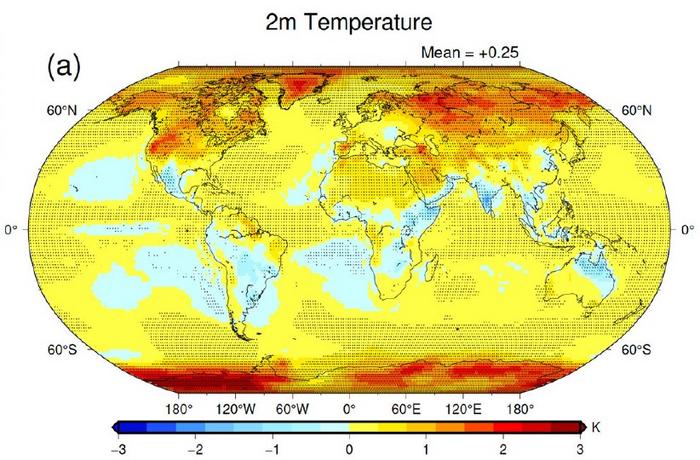One of the key metrics for climate modelling is radiative forcing. Most climate models, including the general circulation models (GCMs), focus on the effects of different atmospheric factors on radiative forcing. However, there are still large uncertainties in satellite observations and multi-model simulations associated with some atmospheric factors. Among them, clouds are a known source of uncertainty in GCMs, leading to radiative biases. However, another possible source of radiative uncertainty is associated with precipitation.

Credit: Takuro Michibata from Okayama University
One of the key metrics for climate modelling is radiative forcing. Most climate models, including the general circulation models (GCMs), focus on the effects of different atmospheric factors on radiative forcing. However, there are still large uncertainties in satellite observations and multi-model simulations associated with some atmospheric factors. Among them, clouds are a known source of uncertainty in GCMs, leading to radiative biases. However, another possible source of radiative uncertainty is associated with precipitation.
In principle, precipitating particles affect radiative forcing by disrupting incoming shortwave and outgoing longwave radiations. But most conventional GCMs in the Coupled Model Intercomparison Project Phase 6 (CMIP6) treat precipitation diagnostically and exclude the radiative effects of precipitation (REP). Extracting the magnitude of REP in climate models is challenging because of complicated atmosphere-ocean feedback and multi-model variabilities. To this end, a new study, published in npj Climate and Atmospheric Science on 19 June 2024, led by Associate Professor Takuro Michibata from Okayama University investigated the influence of REP on radiative forcing at different geographical scales.
Dr. Michibata employed three sub-versions of the Japanese GCM, MIROC6, incorporating different precipitation and radiative calculation treatments. These sub-versions included diagnostic precipitation without REP (DIAG), prognostic precipitation without REP (PROG REP-OFF), and prognostic precipitation with REP (PROG REP-ON), to quantify the influence of precipitating particles on the radiation budgets and hydrological cycles at both global and regional scales. “In addition to modifying the MIROC6 model, we also used 34 climate models from the CMIP6 data archive to better understand the REP on the seasonal variations of the Arctic amplification. Thus, by using sets of simulations and multiple satellite observations, we systematically documented the significance of REP on the global and regional hydrological cycle and energy budget,” explains Dr. Michibata.
The study found that REP affects not only the local thermodynamic profile but also the remote precipitation rate and distribution by altering atmospheric circulation. Due to the precipitating particles in the atmosphere, there is a collective reduction in the net shortwave radiation (“parasol effect”). At the same time, the inverse is observed on the net longwave radiation (“warming effect”), especially in the Arctic zone. As per PROG REP-ON, this results in a weakening of the radiative cooling in the atmosphere and thus slowing down the hydrological cycle at a global level.
The surface warming is more pronounced in the polar regions, with a noticeable increase in surface temperature—by more than 1 K on an average—during winter, as compared to the simulation without REP. This temperature increase is more than twice as large as the summer warming. The study basically emphasizes on the magnitude of surface warming in PROG REP-ON, which is stronger in winter than in summer. This was further verified with the 34 CMIP6 models that also showed systematic variations in Arctic amplification upon factoring in REP.
In contrast, the temperature variations over tropical and subtropical regions were found to be relatively small. In fact, the three-dimensional radiation budget analysis showed that precipitation change was the main effect of REP in the tropics, as opposed to the significant temperature change in the polar regions.
These results indicate that REP has a significant influence on the radiation budget and hydrological cycle at both global and regional scales, which can provide valuable information on REP’s impact mechanism on temperature and precipitation changes. Furthermore, this implies that including REP in GCMs could improve precipitation and temperature biases in climate models and therefore improve the accuracy of these climate simulations against observational evidence.
“Current climate models still have large uncertainties, particularly in simulating the Arctic climate. Given that the Arctic climate is remotely linked to mid-latitude meteorology and weather, this study will contribute towards the improvement of climate models for more accurate prediction of future climate change and changes in the occurrence of extreme weather. Moreover, the process-level understanding in the REP will be useful for other modeling groups in future model development,” concludes Dr. Michibata.
About Okayama University, Japan
As one of the leading universities in Japan, Okayama University aims to create and establish a new paradigm for the sustainable development of the world. Okayama University offers a wide range of academic fields, which become the basis of the integrated graduate schools. This not only allows us to conduct the most advanced and up-to-date research, but also provides an enriching educational experience.
About Associate Professor Takuro Michibata from Okayama University, Japan
Takuro Michibata is an Associate Professor at the Department of Earth Sciences, School of Science at Okayama University, Japan. He leads the COMETS Laboratory (Cloud Observation and Modeling for Earth Technology and Science) at the university focusing on cloud physics and climate science. He has guided several graduate and undergraduate students who have received recognition for their work with him. Dr. Michibata’s research mainly entails working on climate research centered on numerical modeling of aerosol, cloud, and precipitation processes and satellite analysis. He is also engaged in the development of a “satellite simulator” software that connects numerical models with satellites. His research has been published in well-known journals, with many citations.
Journal
npj Climate and Atmospheric Science
Method of Research
Computational simulation/modeling
Subject of Research
Not applicable
Article Title
Radiative effects of precipitation on the global energy budget and Arctic amplification
Article Publication Date
19-Jun-2024
COI Statement
The author declares no competing interests.



